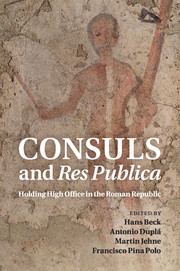Book contents
- Frontmatter
- Contents
- Preface
- Contributors
- The republic and its highest office: some introductory remarks on the Roman consulate
- Part I The creation of the consulship
- Part II Powers and functions of the consulship
- Part III Symbols, models, self-representation
- Chapter 8 The Roman republic as theatre of power: the consuls as leading actors
- Chapter 9 The consul(ar) as exemplum: Fabius Cunctator's paradoxical glory
- Chapter 10 The rise of the consular as a social type in the third and second centuries bc
- Chapter 11 Privata hospitia, beneficia publica? Consul(ar)s, local elite and Roman rule in Italy
- Part IV Ideology, confrontation and the end of the republican consulship
- Bibliography
- Index of persons
- Subject index
Chapter 11 - Privata hospitia, beneficia publica? Consul(ar)s, local elite and Roman rule in Italy
from Part III - Symbols, models, self-representation
Published online by Cambridge University Press: 07 September 2011
- Frontmatter
- Contents
- Preface
- Contributors
- The republic and its highest office: some introductory remarks on the Roman consulate
- Part I The creation of the consulship
- Part II Powers and functions of the consulship
- Part III Symbols, models, self-representation
- Chapter 8 The Roman republic as theatre of power: the consuls as leading actors
- Chapter 9 The consul(ar) as exemplum: Fabius Cunctator's paradoxical glory
- Chapter 10 The rise of the consular as a social type in the third and second centuries bc
- Chapter 11 Privata hospitia, beneficia publica? Consul(ar)s, local elite and Roman rule in Italy
- Part IV Ideology, confrontation and the end of the republican consulship
- Bibliography
- Index of persons
- Subject index
Summary
Livy 42.1 preserves an anecdote that says a great deal about the interaction between Roman consuls (and consulars) and local Italian aristocrats. In 173, the consul Lucius Postumius Albinus departed for Campania to resolve a dispute over the boundaries between public and private lands, and along the way he stayed over at Praeneste. Before arriving, he had sent word ahead demanding that the local magistrates come out to greet him. He stipulated that he should be housed and entertained at public expense, and he further ordered the Praenestines to prepare pack animals for his trip to Campania. Livy claims that Postumius made these high-handed demands because he was angry at the Praenestines for failing to show him appropriate respect when previously, as a private citizen, he had gone to sacrifice at the temple of Fortuna. Livy condemns Postumius for abusing his consular authority and he concludes that the locals, who appear to have accepted Postumius’ demands without incident, must have acquiesced out of modesty or fear; Livy's assessment is not implausible.
This episode highlights the tensions and the ambiguities inherent in the relationship between Rome and the allied communities in Italy during the republican period. On the one hand, the Italian allies were subject to Roman hegemony, and many had been forced into alliance with Rome as the result of military defeat. The occasional arrival of a Roman consul or any other high magistrate, especially one possessing imperium, demanding preferential treatment and public or private gestures of deference, must have reinforced this reality. Indeed, Postumius’ anger at his earlier treatment at Praeneste suggests that Roman aristocrats had grown to expect deferential treatment when they visited Italian communities even when not holding public office. On the other hand, Roman and local aristocratic families often shared close personal and familial bonds. In fact, in the same passage in which he describes the Postumius affair, Livy comments on how Roman senators and local aristocrats commonly enjoyed mutual hospitality (hospitium), with senators opening their homes to guests (members of the Italian elite) in whose houses they would in turn stay when outside of Rome. Moreover, this example demonstrates that it made good practical sense for local elites to forge strong personal bonds with members of the Roman elite and continue to reaffirm those bonds, since, as Postumius’ abusive behavior shows, failing to do so could have serious consequences.
- Type
- Chapter
- Information
- Consuls and Res PublicaHolding High Office in the Roman Republic, pp. 232 - 256Publisher: Cambridge University PressPrint publication year: 2011
- 2
- Cited by



